Search Results | ITTDB (original) (raw)
Robert A. Heinlein
writer
- Filter: Show all works, including those with no time phenomena.
- Found: 17 results in 3.92ms
Novel
For Us, the Living
- by Robert A. Heinlein
- initial unpublished manuscript, 1938
I’m sad that I’ve now read all the extant Heinlein fiction, this posthumous (and first) novel being the last piece for me. It certainly held 3.5 stars worth of enjoyment for a Heinlein fan, but much of that was in seeing the nascent ideas of the writer that I would devour in my childhood. In the story, a military pilot from 1939 dies, and his consciousness is thrown forward to 2086 where social and economic aspects of society are hugely altered, though technological advances are more conservative (but, dammit, I want my flying car).
“Let me get out of these furs.” She walked away while fumbling with a zipper at her throat. The furs were all one garment which slipped off her shoulders and fell to the floor. Perry felt a shock like an icy shower and then a warm tingle.

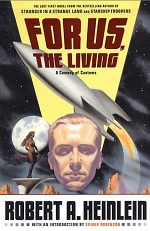
- Eloi Honorable Mention
- Science Fiction
- Definite Time Travel
- > More Details . . .
Short Story

- Undetermined
- Undetermined Time Travel
- > More Details . . .
Short Story

- Science Fiction
- No Time Phenomena
- > More Details . . .
Short Story
Elsewhere
- by Robert A. Heinlein
- Astounding, September 1941
Professor Arthur Frost has a small but willing class of students who explore elsewhere and elsewhen.
Most people think of time as a track that they run on from birth to death as inexorably as a train follows its rails—they feel instinctively that time follows a straight line, the past lying behind, the future lying in front. Now I have reason to believe—to know—that time is analogous to a surface rather than a line, and a rolling hilly surface at that. Think of this track we follow over the surface of time as a winding road cut through hills. Every little way the road branches and the branches follow side canyons. At these branches the crucial decisions of your life take place. You can turn right or left into entirely different futures. Occasionally there is a switchback where one can scramble up or down a bank and skip over a few thousand or million years—if you don’t have your eyes so fixed on the road that you miss the short cut.

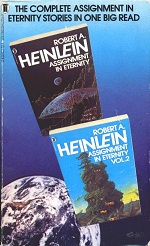
- Eloi Honorable Mention
- Science Fiction
- Definite Time Travel
- > More Details . . .
Short Story
By His Bootstraps
- by Robert A. Heinlein
- Astounding, October 1941
Bob Wilson, Ph.D. student, throws himself 30,000 years into the future, where he tries to figure out what began this whole adventure.
Evan Zweifel gave me a copy of this magazine as a present!
Wait a minute now—he was under no compulsion. He was sure of that. Everything he did and said was the result of his own free will. Even if he didn’t remember the script, there were some things that he knew “Joe” hadn’t said. “Mary had a little lamb,” for example. He would recite a nursery rhyme and get off this damned repetitive treadmill. He opened his mouth—

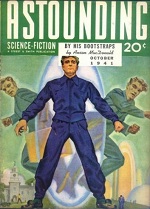
- Eloi Gold Medal
- Science Fiction
- Definite Time Travel
- > More Details . . .
Novel

- Science Fiction
- No Time Phenomena
- > More Details . . .
Novel
The Door Into Summer
- by Robert A. Heinlein
- Magazine of Fantasy and Science Fiction, Oct-Dec 1956
Inventor Dan Davis falls into bad company and wakes up 30 years later, but he gets an idea of how to put things right even at this late point.
Denver in 1970 was a very quaint place with a fine old-fashioned flavor; I became very fond of it. It was nothing like the slick New Plan maze it had been (or would be) when I had arrived (or would arrive) there from Yuma; it still had less than two million people, there were still buses and other vehicular traffic in the streets—there were still streets; I had no trouble finding Colfax Avenue.

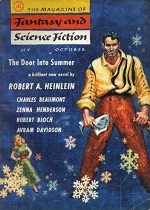
- Eloi Gold Medal
- Science Fiction
- Definite Time Travel
- > More Details . . .
Short Story
“—All You Zombies—”
- by Robert A. Heinlein
- Magazine of Fantasy and Science Fiction, March 1959
A 25-year-old man, originally born as an orphan girl named Jane, tells his story to a 55-year-old bartender who then recruits him for a time-travel adventure. —Michael Main
When I opened you, I found a mess. I sent for the Chief of Surgery while I got the baby out, then we held a consultation with you on the table—and worked for hours to salvage what we could. You had two full sets of organs, both immature, but with the female set well enough developed for you to have a baby. They could never be any use to you again, so we took them out and rearranged things so that you can develop properly as a man.

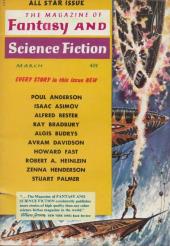
- Science Fiction
- Definite Time Travel
- > More Details . . .
Novel

- Science Fiction
- No Time Phenomena
- > More Details . . .
Novel
Farnham’s Freehold
- by Robert A. Heinlein
- (G. P. Putnam’s Sons, October 1964) [We chose October 1964 as the publication date based on a 1 November 1964 review in the _Anniston Star and the probability that it appeared after the July to October serialization in If._]
Hugh Farnam makes good preparations for his family to survive a nuclear holocaust, but are the preparations good enough to survive a trip to the future?
In his blog, Fred Pohl wrote about how Heinlein’s agent gave permission for Pohl publish the novel in If and to cut “five or ten thousand words in the beginning that were argumentative, extraneous and kind of boring” (and Pohl agreed to pay full rate for the cut words). But apparently, Heinlein “went ballistic” when he saw the first installment, so much so that when the book appeared as a separate publication, Heinlein made sure people knew who was responsible for the previous cuts by adding a note* that “A short version of this novel, as cut and revised by Frederik Pohl, appeared in Worlds of If Magazine.”
* The version of Heinlein’s note that Pohl recalled was much funnier than Heinlein’s actual note in our timeline, but sadly, we have lost track of where we saw Pohl’s version.
—Michael Main
Because the communists are realists. They never risk a war that would hurt them, even if they could win. So they won’t risk one they can’t win.

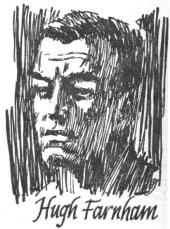
- Science Fiction
- Definite Time Travel
- > More Details . . .
Novel
Time Enough for Love
- by Robert A. Heinlein
- (Putnam, June 1973)
During his 2000 years of misadventures, Lazarus Long has loved and lost and loved again, so now he’s to die, unless Minerva can think of an exciting adventure: perhaps visiting his own childhood?
This sad little lizard told me he was a brontosaurus on his mother’s side. I did not laugh, people who boast of ancestry often have little else to sustain them. Humoring them costs nothing and adds to happiness in a world in which happiness is always in short supply.

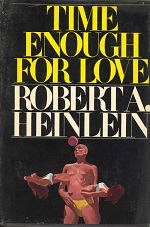
- Eloi Gold Medal
- Science Fiction
- Definite Time Travel
- > More Details . . .
Novel
The Pursuit of the Pankera
- by Robert A. Heinlein
- unpublished, 1977
The 2020 posthumous publication of this 1977 manscript shows us Heinlein’s first forey into the multiperson solipsism of semi-mad scientist Jake Burroughs, his beautiful daughter Deety, her strong love interest Zeb Carter, Hilda Corners and their time/dimension-traveling ship Gay Deceiver. In all, the earlier manuscript has three adventures that were significantly changed in his eventual 1980 publication of the work, retitled as The Number of the Beast:
- In Pankera, the Mars Ten actually is Barsoom where the gang meets the Princess of Mars and others, while in Beast, Mars Ten is a relatively boring futuristic British Mars.
- Pankera has a long adventure in the Lensman universe, while Beast has only a few pages.
- Pankera’s ending is a 30-page, rushed description of how they plan to launch a major war against the Panki, while Beast’s 130-page ending takes the gang to the universe of Dora and Lazurus Long where they rescue Maureen from the past and are joined by a passel of Heinlein’s characters.
In both books, Gay Deceiver can clearly travel through any one of three time axes at will, although that ability is largely ignored apart from Maureen’s rescue in Beast. Because of this, we had a fierce debate up in the ITTDB Citadel about whether to even include Pankera in the database. In the end, we decided yes, marking it as the parent work of Beast, but on account of no easily recognizable time travel, we also marked it as having only debatable time travel. —Michael Main
Sharpie, you have just invented multiperson solipsism. I didn’t think that was mathematically possible.

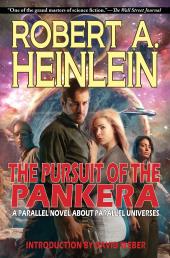
- Science Fiction
- Debatable Time Travel
- > More Details . . .
Novel
The Number of the Beast
- by Robert A. Heinlein
- (Fawcett Columbine, 1980)
Semi-mad scientist Jake Burroughs, his beautiful daughter Deety, her strong love interest Zeb Carter, Hilda Corners (“Aunt Hilda” if you prefer) and their time/dimension-traveling ship Gay Deceiver yak and smooch their way though many time periods in many universes (including that of Lazurus Long), soon realizing the true nature of the world as pantheistic multiperson solipsism.
In Heinlein’s first version of this novel, written in 1977, the middle third of the story takes place on Barsoom, but in the 1980 published version, Barsoom was replaced by a futuristic British Mars —Michael Main
Sharpie, you have just invented multiperson solipsism. I didn’t think that was mathematically possible.


- Science Fiction
- Definite Time Travel
- > More Details . . .
Novel
The Cat Who Walks Through Walls
- by Robert A. Heinlein
- (G. P. Putnam’s Sons, November 1985)
Richard Ames doesn’t like the fact that a new acquaintance was killed while dining at his table. Killed, why? and by whom? and why won’t that cat stay put? The eventual answers could lead Richard to Lazarus Long, the Time Corps, and more multiperson pantheistic solipsism.
My darling had planned a pianissimo approach: Live for a time on Tertius (a heavenly place), get me hooked on multiverse history and time travel theory, et cetera. Not crowd me about signing up, but depend on the fact that she and Gretchen and Ezra and others (Uncle Jock, e.g.) were in the Corps. . . until I asked to be allowed to be sworn in.

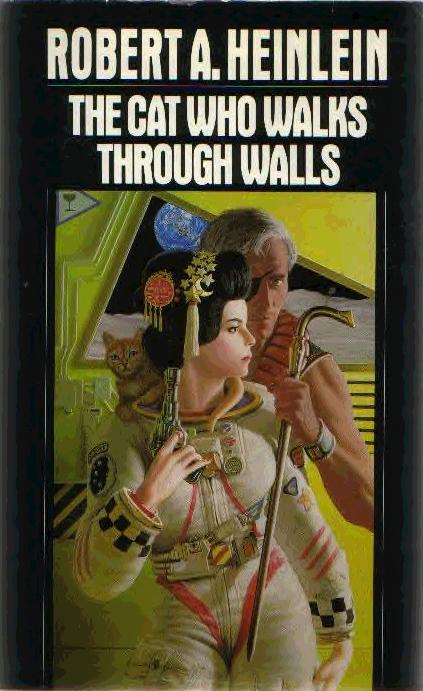
- Science Fiction
- Definite Time Travel
- > More Details . . .
Novel
To Sail Beyond the Sunset
- by Robert A. Heinlein
- (Ace / Putnam, July 1987)
In the 19th century, Maureen Johnson grows up near Kansas City, eventually marrying and raising her own brood, including Lazarus Long (the original) and Lazarus Long (from the future).
I found myself offering my hand and greeting a young man who matched in every way (even to his body odor, which I caught quite clearly—clean male, in fresh rut)—a man who was my father as my earliest memory recalled him.

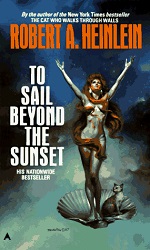
- Eloi Bronze Medal
- Science Fiction
- Definite Time Travel
- > More Details . . .
Novel

- Science Fiction
- Audience: YA and Up
- No Time Phenomena
- > More Details . . .
Feature Film
Predestination
- written and directed by Michael Spierig and Peter Spierig
- (South by Southwest Film Festival, Austin, Texas, 8 March 2014)
I was so disappointed with this movie that I’m going to have to write a spoiler. So if you don’t want to be spoiled, please don't hover your mouse over the following:
Here’s the problem: Heinlein’s story “—All You Zombies—” was the last word on one specific kind of time travel story: The story is which there is but one timeline. If you travel to the past and do something, it is because you traveled to the past and did that thing. But the Spierig brothers completely missed this point by introducing an older version of the Unmarried Mother who has newspaper clippings of other timelines that he has changed. The nice closed sexual loop is still present in the movie, but that wasn’t enough to stop my disappointment at the drubbing that the central story idea took. I wasn’t so hot on the music either (except for “I’m My Own Grandpa”), but the relationship between the Barkeep and the Unmarried Mother was spot on as was the depiction of time travel and the foreshadowing. —Michael Main
Unmarried Mother: So I can do this, I can change my past?
Barkeep: Yes, you can.
U.M.: Have you ever thought about changing yours?
BK: I never deviate from the mission.
U.M.: Never?
BK: Never. . . . Look, I’ll pick you up when you’re done, all right?
U.M.: No, whoa, where are you going?
BK: Don’t worry. I’ll be around, trust me.
U.M.: Do I? . . . Do I have a choice?
BK: Of course. You always have a choice.
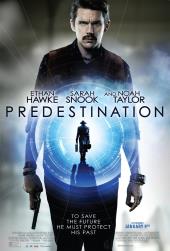
- Science Fiction
- Definite Time Travel
- > More Details . . .